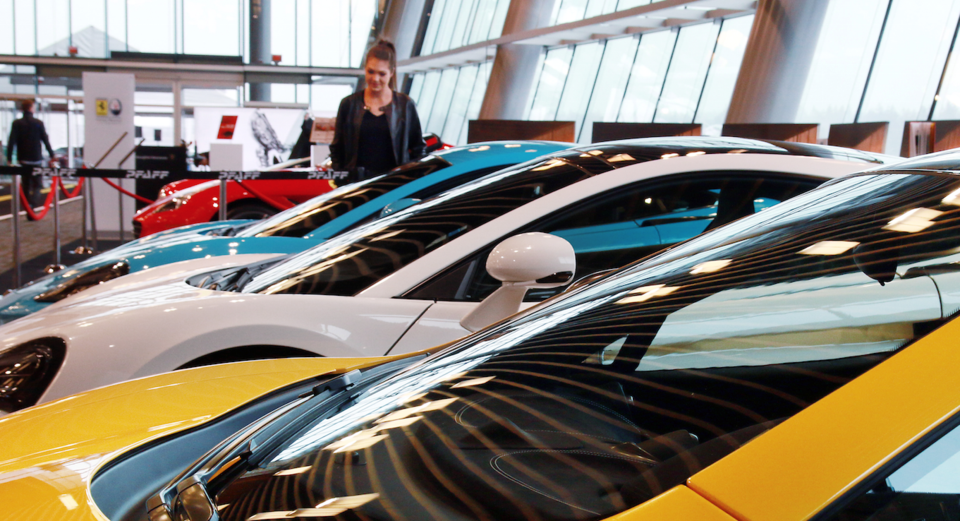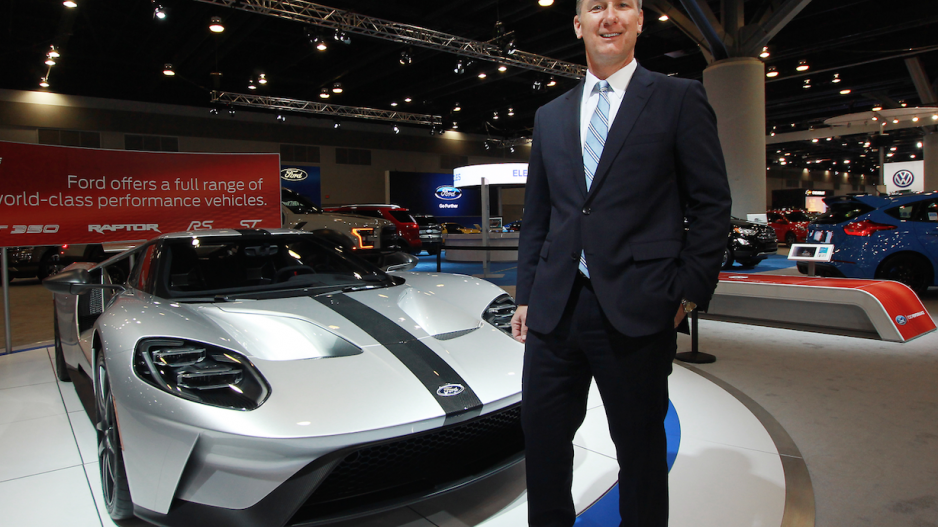Mark Buzzell stands admiring a grey Ford GT at the Vancouver International Autoshow and jokes that he is scared to touch the car for fear of damaging it somehow.
As Ford Canada’s president, Buzzell is one of the few people at the show allowed to climb into the sleek sports car that sells for about $400,000, but he didn’t want to test his luck.
The car is emblematic of Ford Motor Co.’s (NYSE:F) effort to evolve its brand away from being seen by many as largely a maker of pickup trucks.
Ford makes only 250 of its GT sports cars each year, and all of them are manufactured in Ontario.
“There is very high demand and a special process that you have to go through to get one,” said Buzzell. “We’re looking to attract people who are Ford enthusiasts.”
Ford started selling its high-end GT sports cars about two months ago, and Buzzell would not be surprised if someone from B.C. bought one of them, given the province’s reputation for being a hot market for supercars, or luxury sports cars, as well as other luxury vehicles.
“In Canada, about 12% of the market is what we call luxury,” he said. “Part of our play with luxury vehicles is the global reinvention of our Lincoln brand, where we’ve come out with four new products in the last four years.”
The U.S. remains the biggest market for Lincoln vehicles, but the brand has made huge strides in China, and that country, with 65 dealerships, has passed Canada to become the brand’s second most important market.
These are good times for vehicle sales worldwide as well as in Canada.
Researchers at DesRosiers Automotive Consultants counted 1.95 million vehicles sold in Canada last year, although not all brands were included. Ferrari (Nasdaq:RACE), for example, famously never reveals sales figures.
Regardless, DesRosiers data shows vehicle sales were up 2.7% in 2016 from a year earlier.
The pace has continued in 2017’s first two months, with vehicle sales up another 2.7% from last year.

(Image: Luxury sportscars were on display at the Vancouver International Autoshow last week | Rob Kruyt)
Luxury brands are leading the way, primarily because they have hopped on another trend: the shift away from cars to SUVs.
Maserati led major auto brands with a supercharged year-over-year growth rate of 479.1% in 2017’s first two months to 249 vehicles sold, according to DesRosiers statistics.
“Sales are completely exploding,” said Mark Edmonds, general manager of Ferrari Maserati of Vancouver.
“Much of that is because Maserati introduced an SUV, which is a segment that is booming across the entire automotive spectrum.”
Jaguar is another brand that is associated with sporty vehicles, and it too introduced an SUV and watched sales soar.
DesRosiers pins Jaguar sales Canada-wide as being up 244.8% year-over-year, to 569 vehicles, in 2017’s first two months.
“Jaguar’s new SUV accounts for most of the sales,” said Caleb Kwok, Jaguar Vancouver’s sales manager.
“It’s definitely the SUV sales that are pushing overall Jaguar sales up. The [traditional Jaguar sports car] F-Type sales are flat.”
Both Edmonds and Kwok say that B.C.’s sales for their luxury brands likely mirror national growth rates but that the province punches above its weight when it comes to per capita sales.
One distinguishing factor, however, between the brisk-selling high-end SUVs and the more affordable Ford SUVs (Explorers, Edges and Escapes) is that Ford’s products increasingly have automated features, such as collision detection that subtly taps on the brakes. Buzzell believes that fully automated self-driving cars could be on the market in Canada by 2021.
Edmonds and Kwok say their customers tend to be more hands-on drivers who love to have control of their vehicle and that this is why there are limited automated features in Jaguars and Maseratis.
“People buy Jaguars because they can feel connected to the road,” Kwok said. “They like the feel of the road, and they like the feeling of the rubber, the steering wheel and the engine noise. That’s what people buy Jaguars for.” •




